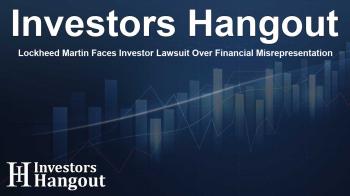Lockheed Martin Faces Investor Lawsuit Over Financial Misrepresentation

Understanding the Lockheed Martin Investor Lawsuit
The legal landscape is shifting for Lockheed Martin Corporation, a global leader in aerospace and defense, as it faces a significant class action lawsuit that questions its financial disclosures. This lawsuit is particularly focused on the period when investors made substantial investments, expecting solid performance backed by robust internal controls.
Nature of the Allegations
Filed by a group of investors, the lawsuit alleges that Lockheed Martin misrepresented its financial stability and capabilities. It emphasizes a lack of effective internal controls that were supposed to assess program risks accurately. In essence, investors are claiming that they were given a distorted view of the company’s financial situation, which could have led to misguided investment decisions.
Key Points of the Case
The core of this lawsuit, called Khan v. Lockheed Martin Corporation, raises serious concerns regarding the company's operational transparency. The plaintiffs argue that, during the class period, the company consistently overstated its performance and ability to fulfill contractual obligations, particularly in its Aeronautics and Rotary and Mission Systems divisions.
Emerging Issues Linked to Disclosures
As the lawsuit unfolds, the focus will shift towards the revelations that have emerged over time. Investors started learning about the company’s troubling financial situation through a series of negative disclosures that had a direct impact on stock prices. For instance:
- In a significant announcement on January 28, 2025, Lockheed Martin disclosed pre-tax losses totaling $1.8 billion in its Aeronautics segment.
- Shortly thereafter, on April 17, 2025, Lockheed Martin made headlines with the sudden departure of its CFO.
- Further exacerbating the situation, on July 22, 2025, the company reported additional staggering losses of $950 million in its Aeronautics segment and $570 million in its RMS segment relating to issues tied to the Canadian Maritime Helicopter Program.
Each of these setbacks prompted a nearly 11% drop in stock value when the last disclosure was made, highlighting the gravity of the issues at hand.
The Investigation by Hagens Berman
Leading the charge in this case is Hagens Berman, a well-known plaintiffs' rights law firm dedicated to investigating these serious allegations. They are looking into whether the financial losses suffered were foreseeable due to inadequate internal controls and whether Lockheed Martin adequately communicated risks to its investors.
Statements from the Legal Team
Reed Kathrein, a partner at Hagens Berman, remarked, "The extent of these losses and their recurrence across different programs suggests a systemic problem rather than isolated incidents. Our inquiry centers around whether Lockheed Martin's executives were aware of the deficiencies in their internal controls, which misled investors who trusted the company to handle their investments with diligence."
What This Means for Investors
For investors with prolonged losses, this lawsuit could represent a critical opportunity for recourse. Those who invested during the defined period may be eligible to join the class action, especially if they possess information that could assist in substantiating the claims of financial misrepresentation.
Potential Benefits of Participation
Participation in the class action lawsuit may provide a path for recovering some of the financial losses. The firm is particularly interested in gathering testimonials and evidence that showcase the impact of the company's misleading statements on investors’ financial decisions.
How to Seek Further Information
If you’re an investor in Lockheed Martin and you believe you may have suffered losses due to the misinformation provided, it’s advisable to contact the legal representatives at Hagens Berman. They are actively gathering more details from investors in connection with this case.
Frequently Asked Questions
What is the basis of the lawsuit against Lockheed Martin?
The lawsuit claims that Lockheed Martin misrepresented its financial health and lacked adequate internal controls, misleading investors during the investment period.
Who can join the class action lawsuit?
Any investor who purchased Lockheed Martin shares between the specified dates and incurred significant losses may be eligible to join the class action.
How can I participate in the lawsuit?
Interested investors should contact Hagens Berman or similar legal entities to see if they qualify and to gather more information.
What damages are being sought in the lawsuit?
The lawsuit aims to seek compensation for the financial losses that investors sustained as a result of the alleged misleading statements made by Lockheed Martin.
When did the critical disclosures occur?
Key disclosures that impacted stock prices occurred between January 2025 and July 2025, revealing substantial financial losses within the company.
About The Author
Contact Kelly Martin privately here. Or send an email with ATTN: Kelly Martin as the subject to contact@investorshangout.com.
About Investors Hangout
Investors Hangout is a leading online stock forum for financial discussion and learning, offering a wide range of free tools and resources. It draws in traders of all levels, who exchange market knowledge, investigate trading tactics, and keep an eye on industry developments in real time. Featuring financial articles, stock message boards, quotes, charts, company profiles, and live news updates. Through cooperative learning and a wealth of informational resources, it helps users from novices creating their first portfolios to experts honing their techniques. Join Investors Hangout today: https://investorshangout.com/
The content of this article is based on factual, publicly available information and does not represent legal, financial, or investment advice. Investors Hangout does not offer financial advice, and the author is not a licensed financial advisor. Consult a qualified advisor before making any financial or investment decisions based on this article. This article should not be considered advice to purchase, sell, or hold any securities or other investments. If any of the material provided here is inaccurate, please contact us for corrections.

